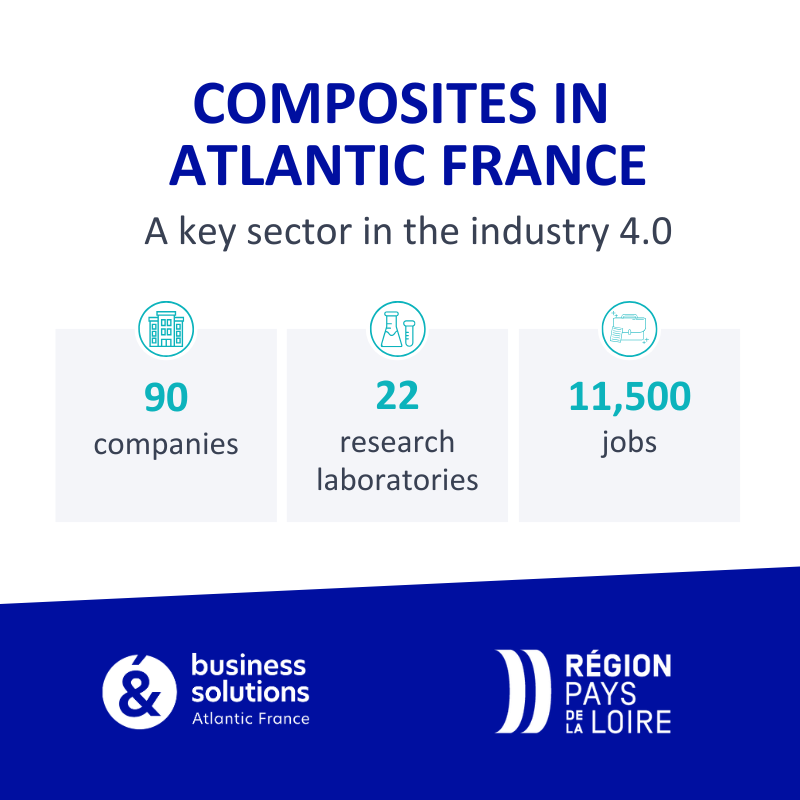From the 4th to the 6th of March, the JEC World 2025 will bring together the global composites industry in Paris. As the leading international trade show for composites, it serves as the ultimate meeting point for the sector. Atlantic France will be at the forefront, showcasing innovations that reinforce its position as a major hub for advanced materials.

With a thriving ecosystem of industrial leaders, research centres, and innovative SMEs, the Atlantic France region plays a strategic role in the evolution of composite materials. Whether in aeronautics, marine renewable energy, sailing, or mobility, Atlantic France continues to push boundaries, merging high-performance materials with sustainable solutions.
JEC World presents a key opportunity for companies, researchers, and industrial players from Atlantic France to present their latest advancements. The EMC2 cluster, a major European hub for advanced manufacturing technologies, will once again represent the region alongside pioneering companies and research institutions.
From high-performance lightweight materials to cutting-edge recycling processes, exhibitors from Atlantic France will highlight their latest solutions designed to tackle the pressing challenges of efficiency, the circular economy, and decarbonisation.
The composite market in Atlantic France: a dynamic ecosystem
Key figures of the composite industry in Atlantic France
companies
research laboratories
jobs
With global giants like Airbus and Bénéteau operating in the region, Atlantic France benefits from a strong industrial network and a diversified application market. Many companies are both users and manufacturers of composite parts, fostering a robust and innovative supply chain.
The region is home to several leading R&D centres, clusters, and platforms dedicated to advanced materials:
- Composites Technocampus: a world-class R&D centre specialising in large-scale composite structures, bringing together key industry players like Cetim.
- IRT Jules Verne: a research institute near Nantes focused on advanced manufacturing, automation, and lightweight materials.
- IPC (Industrial Technical Centre for Plastics and Composites): driving composite material innovation with a focus on industrial applications.
- EMC2 and Polyméris competitiveness clusters: facilitating collaborative projects between industry and research to accelerate innovation.
These institutions provide companies in Atlantic France with cutting-edge expertise, state-of-the-art facilities, and collaborative innovation opportunities to stay ahead in the global composites market.
Pioneering sustainability in composites
With increasing demand for sustainable materials and responsible manufacturing, companies in Atlantic France are leading efforts in composite recycling, waste reduction, and end-of-life solutions.
A world first: the thermoplastic wind turbine blade
The collaborative Zebra (Zero waste blade research) project, led by IRT Jules Verne in Nantes, has developed the world’s first recyclable thermoplastic wind turbine blade. This breakthrough innovation moves away from traditional thermoset composites, offering a fully recyclable alternative that significantly improves the environmental footprint of wind energy.
Daher: upcycling composite waste into high-performance components
Aeronautical supplier Daher, based in Atlantic France, has taken a major step in sustainable composite manufacturing. After three years of R&D, the company has developed a process to recycle and repurpose composite offcuts, transforming them into high-performance thermoplastic rudder pedals for aircraft. This initiative eliminates landfill waste and opens new possibilities for sustainable aeronautical design.
Fairmat: innovative carbon fibre recycling
Since opening its 4.0 factory in Atlantic France in 2022, Fairmat has been transforming the composite industry with its carbon fibre recycling technology. The company recently unveiled FairPly, a recycled composite that reduces CO2 emissions by up to 90%. Developed using AI, robotics, and digital twin technology, this innovative material is designed for aerospace, automotive, and renewable energy industries. It offers faster production and 5% cost savings compared to existing solutions, while integrating seamlessly into industrial processes.
The company has also introduced Infinite Recycling, its patented technology enabling unlimited reuse without quality loss. With a target of 300 tonnes of annual production by 2028, Fairmat has partnered with DPS Skis to incorporate its recycled materials into sports equipment.
Culture iN: an innovative plant-based material for acoustics
France is the leading global producer of high-quality flax, representing 70% of world production. The company Culture iN, based in Vendée, has invented a sustainable textile made from flax threads and vegetable resin PLA (corn starch) which is used in interior design for its acoustic properties. Over the last few years, the company has led three rounds of fundraising (€1.6 million in total) to sustain its development.
Composite Recycling: pioneering GFRP recycling
The Switzerland-based company Composite Recycling has chosen Nantes, Atlantic France, as the location for its first subsidiary in Europe. The company has developed an innovative process for recycling glass fibre-reinforced plastics (GFRP) by separating the glass fibre from the resin in composite materials.
We’ve been very impressed by the proactiveness and professionalism of the local representatives we’ve worked with. The region’s determination to create a complete composites recycling industry is an essential factor in our success.
Guillaume Perben, Managing Director
Atlantic France at the heart of European composite research
In July 2024, the European Conference of Composite Materials (ECCM) was held in Nantes, reinforcing the city’s position as a key hub for composite research. Organised by Nantes University and Centrale Nantes, the event brought together leading academics and industry professionals from around the world to discuss the future of composite materials and their role in creating a more sustainable and high-performance industry.


 日本語
日本語  Français
Français 